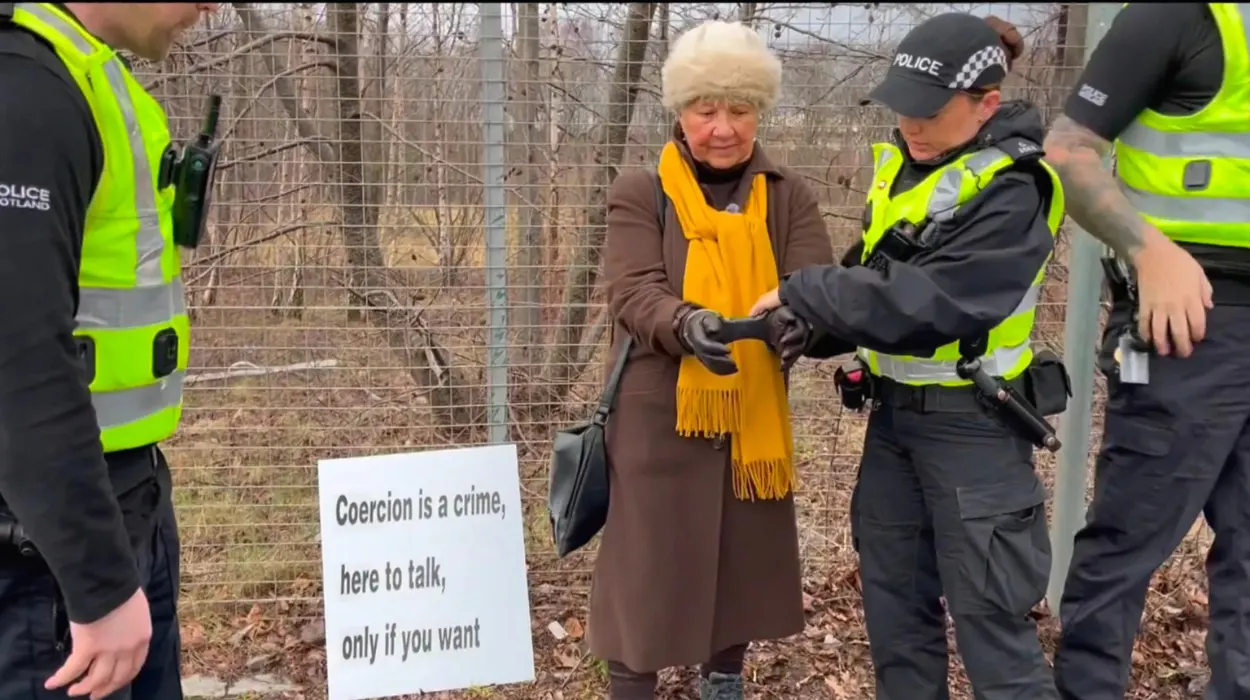Washington (Parliament Politics Magazine) – The US praised Scotland’s decision to drop charges against anti-abortion protester Rose Docherty, supporting free speech and peaceful protest rights.
As reported by The Telegraph, US officials praised Scottish prosecutors for dismissing charges against the anti-abortion activist.
Rose Docherty’s arrest during a protest
In February, 75-year-old Rose Docherty was detained during an anti-abortion protest at Glasgow’s Queen Elizabeth University Hospital.
During the protest, she held a sign stating,
“Coercion is a crime, here to talk, only if you want.”
Earlier this week, the Crown Office and Procurator Fiscal Service confirmed no further legal action will be taken against Ms Docherty.
What did the US State Department say about Rose Docherty’s protest ruling?
Referring to Rose Docherty’s ruling, a US State Department spokesperson stated,
“We applaud Scotland’s sensible decision to refrain from further legal action against Rose Docherty.”
They added,
“The United States stands with all those fighting for free speech and religious liberty.”
Rose Docherty’s views on being cleared by prosecutors
Ms Docherty stated,
“This is a victory not just for me, but for everyone in Scotland who believes we should be free to hold a peaceful conversation.”
She added,
“I stood with love and compassion, ready to listen to anyone who wanted to talk. Criminalising kindness has no place in a free society.”
What role did the Trump administration play in Docherty’s ruling?
The move to clear Rose Docherty came after months of review by the Trump administration, which has shown a growing willingness to engage in UK domestic free speech issues.
A US delegation visited Britain in March to meet pro-life campaigners, including Docherty, amid concerns over declining free speech protections.
After the visit, Ms Docherty added it was
“heartening that others around the world, including the US government, have realised this injustice and voiced their support.”
Under Scotland’s new abortion buffer zones law, effective since September, Ms Docherty became the first woman arrested. In response, the White House sent a five-member team to meet protesters arrested for silent demonstrations outside abortion clinics.
The team’s goal is to
“affirm the importance of freedom of expression in the UK and across Europe.”
Samuel Samson, a senior State Department adviser, led the US delegation, meeting UK officials and raising concerns over the Online Safety Act with Ofcom.
Officials also held a private meeting with a few anti-abortion activists at an unmarked office location.
What did Lois McLatchie Miller say about Rose Docherty and free speech support?
Lois McLatchie Miller of ADF International said,
“Every Scot has the right to speak freely and to offer compassionate conversation without fear of prosecution.”
He added,
“It’s vital for allies to stand together in defence of this fundamental freedom, and we welcome the outpouring of support Rose has received both at home and abroad, including from the United States, which is a key voice for the protection of free speech worldwide.”
What did JD Vance say about free speech in the US and the West?
Earlier this month, US Vice President JD Vance, during his visit to the UK, said,
“I’ve raised concerns about free speech in the United States of America. I think the entire collective West, the transatlantic relationship, our Nato allies, certainly the United States under the Biden administration, got a little too comfortable with censoring rather than engaging with a diverse array of opinions.”
He added,
“So that’s been my view. Obviously, I’ve raised some criticism and concerns about our friends on this side of the Atlantic, but the thing that I say to the people of England, or anybody else, to David, is many of the things that I worry most about were happening in the United States from 2020 to 2024.”
Britain’s Online Safety Act
The Online Safety Act requires platforms to protect free speech while ensuring safety. It criminalises sharing harmful false information, raising debate concerns.
The Act allows scanning encrypted messages, sparking privacy and censorship fears. It also requires platforms to prevent children from accessing harmful content using age verification or age estimation tools


